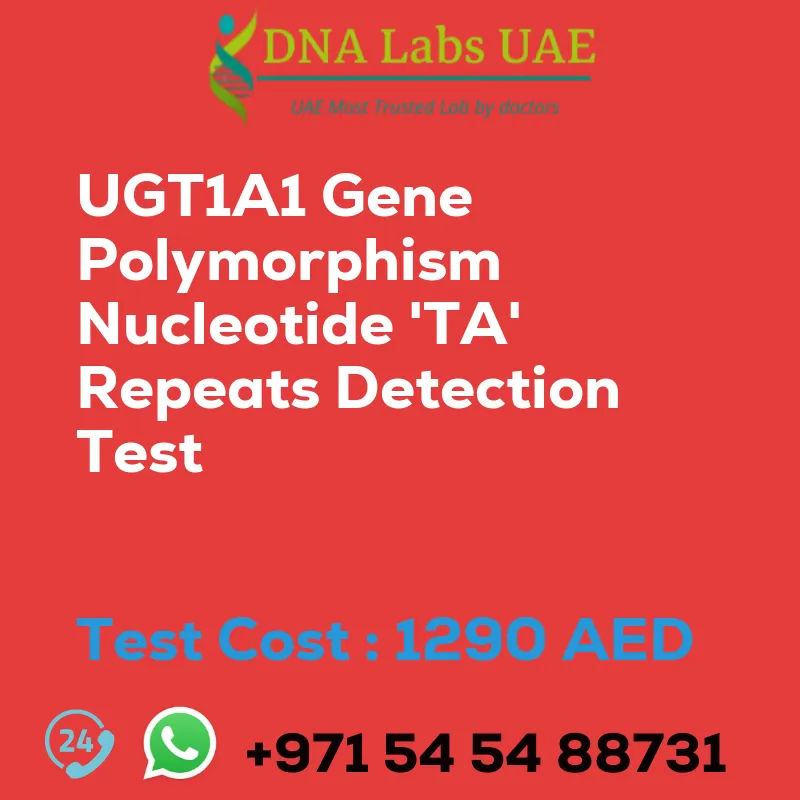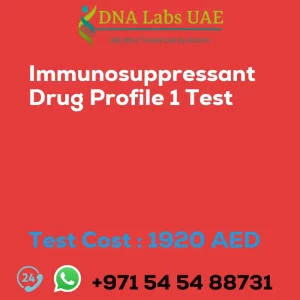UGT1A1 GENE POLYMORPHISM NUCLEOTIDE ‘TA’ REPEATS DETECTION Test
Test Name: UGT1A1 GENE POLYMORPHISM NUCLEOTIDE ‘TA’ REPEATS DETECTION Test
Components: Price 1290.0 AED
Sample Condition: 4 mL (2 mL min.) whole Blood in 1 Lavender top (EDTA) tube. Ship refrigerated. DO NOT FREEZE.
Report Delivery: SampleMon / Wed by 9 am; Report 7 Working days
Method: PCR, Fragment analysis
Test type: Disorders of Liver, Pharmacogenomics
Doctor: Gastroenterologist, Oncologist
Test Department: MOLECULAR DIAGNOSTICS
Pre Test Information: No special preparation required
Test Details:
The UGT1A1 gene polymorphism detection test is a genetic test that identifies the presence of a specific variation in the UGT1A1 gene. This variation involves the repetition of a specific sequence of nucleotides, specifically ‘TA’ repeats, within the gene. The UGT1A1 gene encodes an enzyme called uridine diphosphate glucuronosyltransferase 1A1, which is involved in the metabolism and elimination of various drugs and toxins from the body.
The number of ‘TA’ repeats in the UGT1A1 gene can affect the activity of this enzyme, leading to variations in drug metabolism and response. The UGT1A1 gene polymorphism detection test typically involves analyzing a person’s DNA sample, usually obtained through a blood or saliva sample. The DNA is examined to determine the number of ‘TA’ repeats in the UGT1A1 gene.
The results of the test can help healthcare professionals predict how an individual may respond to certain medications. For example, individuals with a specific number of ‘TA’ repeats may have reduced activity of the UGT1A1 enzyme, resulting in slower metabolism of drugs that are cleared by this enzyme. This can increase the risk of adverse drug reactions and require dosage adjustments.
The UGT1A1 gene polymorphism detection test is particularly important in the context of certain medications, such as irinotecan, which is used in the treatment of various cancers. Individuals with specific UGT1A1 gene variations may be at higher risk of severe side effects from irinotecan, such as neutropenia and diarrhea. Therefore, testing for this gene polymorphism can help guide personalized treatment decisions and optimize drug safety and efficacy.
It is important to note that the UGT1A1 gene polymorphism detection test is typically ordered by a healthcare professional and should be interpreted in conjunction with other clinical information. Genetic counseling may also be recommended to help individuals understand the implications of their test results and make informed decisions about their healthcare.
| Test Name | UGT1A1 GENE POLYMORPHISM NUCLEOTIDE ‘TA’ REPEATS DETECTION Test |
|---|---|
| Components | |
| Price | 1290.0 AED |
| Sample Condition | 4 mL (2 mL min.) whole Blood in 1 Lavender top (EDTA) tube. Ship refrigerated. DO NOT FREEZE. |
| Report Delivery | SampleMon / Wed by 9 am; Report 7 Working days |
| Method | PCR, Fragment analysis |
| Test type | Disorders of Liver, Pharmacogenomics |
| Doctor | Gastroenterologist, Oncologist |
| Test Department: | MOLECULAR DIAGNOSTICS |
| Pre Test Information | No special preparation required |
| Test Details | The UGT1A1 gene polymorphism detection test is a genetic test that identifies the presence of a specific variation in the UGT1A1 gene. This variation involves the repetition of a specific sequence of nucleotides, specifically ‘TA’ repeats, within the gene. The UGT1A1 gene encodes an enzyme called uridine diphosphate glucuronosyltransferase 1A1, which is involved in the metabolism and elimination of various drugs and toxins from the body. The number of ‘TA’ repeats in the UGT1A1 gene can affect the activity of this enzyme, leading to variations in drug metabolism and response. The UGT1A1 gene polymorphism detection test typically involves analyzing a person’s DNA sample, usually obtained through a blood or saliva sample. The DNA is examined to determine the number of ‘TA’ repeats in the UGT1A1 gene. The results of the test can help healthcare professionals predict how an individual may respond to certain medications. For example, individuals with a specific number of ‘TA’ repeats may have reduced activity of the UGT1A1 enzyme, resulting in slower metabolism of drugs that are cleared by this enzyme. This can increase the risk of adverse drug reactions and require dosage adjustments. The UGT1A1 gene polymorphism detection test is particularly important in the context of certain medications, such as irinotecan, which is used in the treatment of various cancers. Individuals with specific UGT1A1 gene variations may be at higher risk of severe side effects from irinotecan, such as neutropenia and diarrhea. Therefore, testing for this gene polymorphism can help guide personalized treatment decisions and optimize drug safety and efficacy. It is important to note that the UGT1A1 gene polymorphism detection test is typically ordered by a healthcare professional and should be interpreted in conjunction with other clinical information. Genetic counseling may also be recommended to help individuals understand the implications of their test results and make informed decisions about their healthcare. |







